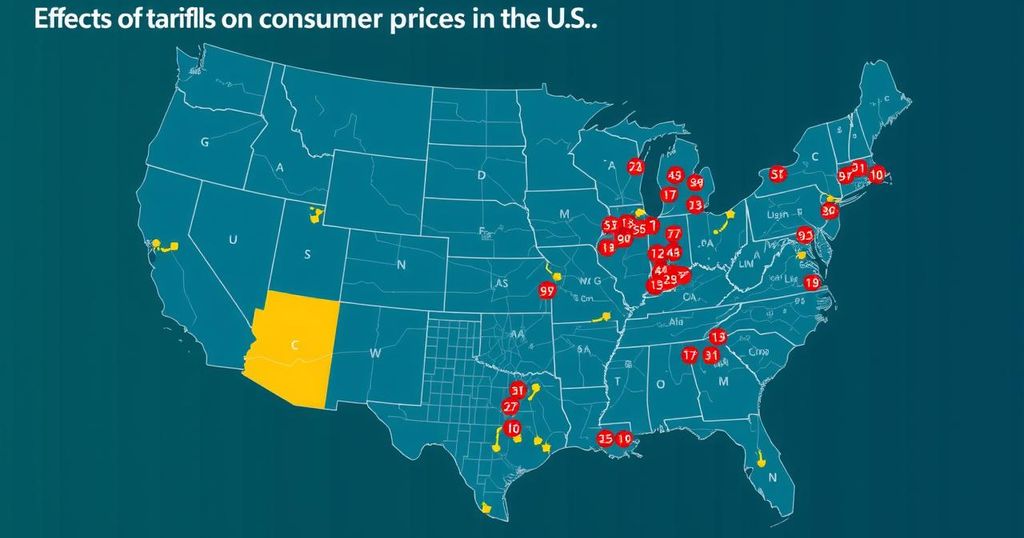Impact of Trump’s Tariffs on U.S. Consumers: An Overview

President Trump’s proposed tariffs on imports from Mexico, Canada, and China may lead to significant price increases for consumers. With a potential 25 percent tariff on imports from Canada and Mexico, and a 10 percent tariff on goods from China, the costs of essential items could rise dramatically. Economic experts warn of inflationary pressures that could affect various sectors, including fuel, automotive, electronics, and food, impacting day-to-day expenses for American households.
President Trump’s proposed tariffs on imported goods from Mexico, Canada, and China could significantly affect American consumers. With a potential 25 percent tariff on imported goods from Canada and Mexico, and a 10 percent tariff on goods from China, everyday items such as oil, vehicles, electronics, and groceries may see price increases. As these countries are major suppliers to the U.S. economy, the impact of these tariffs may not only elevate consumer costs but also contribute to broader inflationary pressures.
The reliance on imports from these three countries encompasses a wide range of products, including crude oil, which constitutes a significant portion of U.S. oil imports. Canada alone supplies 60 percent of crude oil imports to the U.S., a reliance that suggests that tariff impositions could lead to higher gasoline prices at the pump. An industry expert noted the probable spike in gas prices due to this tariff strategy, citing the intricacies of oil refining processes and existing capacity limitations in the U.S.
Moreover, the United States imports a substantial amount of automotive parts from Mexico, which represents 27 percent of total imports from that country. Analysts warn that any import tariffs would inevitably lead to increased vehicle prices, an outcome that could have dire consequences for the American automotive industry. Similarly, tariffs on electronic equipment sourced from China, a large segment of U.S. imports from this country, may also burden consumers with rising prices for electronics and associated products.
Food prices, too, stand at risk under these tariff proposals. The U.S. spends over $20 billion annually on horticultural products from Canada and Mexico, with notable imports such as fresh vegetables and fruits. The anticipated price increases could exacerbate the already burdensome inflation on groceries, which have climbed significantly since 2020. Furthermore, tariffs would likely drive up the costs of meat and sugar imports from these partners, further impacting American households.
Finally, other goods such as toys, wood, and plastics are heavily reliant on imports from these three countries. Each of these categories may experience notable price increases due to augmenting tariffs, leading to an overall elevation in consumer costs across the board. Experts emphasize that the global interconnectedness of supply chains underscores the potential ramifications of these policy measures across seemingly disconnected products.
The proposed tariffs by President Trump target imports from the United States’ three largest trading partners, Mexico, Canada, and China, with the intent to protect domestic industries. As these nations supply a large proportion of goods consumed in the United States, including crude oil, automobiles, electronics, and various food products, tariffs could fundamentally alter the cost structure of everyday items. The initiative is presented as a strategy to curb illegal immigration and drug smuggling while simultaneously bolstering American manufacturing. However, economic experts caution that such measures often lead to increased prices for consumers, which may counteract intended benefits.
In conclusion, President Trump’s proposed tariffs on imports from Mexico, Canada, and China raise significant concerns regarding their impact on U.S. consumers. Potential price increases across various categories of goods, including fuel, vehicles, electronics, and food, could lead to heightened inflationary pressures. As experts suggest, the interconnected nature of global supply chains means that the repercussions of these tariffs will likely resonate beyond mere price hikes, potentially destabilizing significant sectors of the economy. It will be essential for stakeholders to closely monitor these developments and their implications for American consumers.
Original Source: www.independent.co.uk








